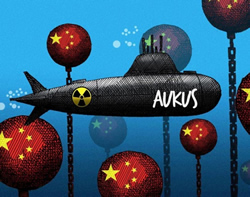With the dust beginning to settle on the AUKUS agreement, Yun Sun* says Beijing is left to consider some very difficult options for its long-term response.
 More than a month has passed since the announcement of the defence cooperation agreement among Australia, the United Kingdom, and the United States (AUKUS).
More than a month has passed since the announcement of the defence cooperation agreement among Australia, the United Kingdom, and the United States (AUKUS).
While the deal includes cooperation in a variety of areas, the most eye-catching aspect is the sales of nuclear-powered submarines, a crown jewel of US military technology, to Australia.
Although AUKUS does not mention China directly, it is well understood that China motivated the formation of this partnership.
Given the scope of AUKUS and its relatively long implementation timeframe, here are four ways to analyse Chinese reactions.
Threat assessment
The Chinese worry about Australia obtaining nuclear-powered submarines, but do not consider the threat urgent.
They are concerned by the impact such submarines have on their maritime domains, especially in the South China Sea and the Taiwan Strait.
Beijing, therefore, has focused on the deal’s geopolitical impact and attacked AUKUS, arguing that it is the product of a “Cold War mentality” which will undermine regional security and stability.
Some have equated AUKUS with an “Asian version of NATO,” with the potential to expand to include other like-minded countries.
There is a feeling that Beijing will wait and see before assessing the real impact of AUKUS, as the details remain elusive and consultations will take time.
Beijing also believes that AUKUS could be scrapped by a future Australian Government, especially considering its high financial and strategic costs.
The fact that three former Australian Prime Ministers have expressed varying reactions to AUKUS leaves China with a sense of hope that this may not be a done deal.
Impact on proliferation
The most stringent Chinese attacks on AUKUS have focused on its implications for non-proliferation.
The Chinese Permanent Representative to the United Nations in Vienna made a statement on the deal’s “undisguised nuclear proliferation activities”.
He called for the International Atomic Energy Agency (IAEA) to publicly condemn AUKUS which, he claimed, demonstrated the “double standard” the United States and United Kingdom pursued in nuclear exports.
According to Director of the Arms Control Center at the China Institute of Contemporary International Relations, Guo Xiaobing AUKUS violates the mission and core obligations of the Nuclear Nonproliferation Treaty (NPT) in five different ways.
It contributes to the proliferation of a delivery system for weapons of mass destruction.
It contributes to the proliferation of fissile materials that could be used to make nuclear weapons.
It has the potential to lead to the proliferation of uranium enrichment technologies.
It undermines the NPT because it sets a bad precedent.
It could fuel a regional arms race.
AUKUS does not violate the NPT.
The IAEA Safeguard Glossary states that nuclear material covered by a comprehensive safeguards agreement may be withdrawn from IAEA safeguards should the State decide to use it for purposes including the propulsion of naval vessels.
This, in other words, excludes nuclear-powered submarines from IAEA safeguarding requirements.
China’s attack on AUKUS can claim it violates the spirit of the NPT, but not its letter.
Potential responses
Given the impact of AUKUS is not immediate, Chinese reactions will take time to manifest.
At present, China appears to prioritise understanding the scope and details of AUKUS and attacking its legitimacy for geopolitical and nonproliferation reasons.
Still, in retaliation, some have proposed additional economic sanctions on Australia through trade.
Chief Editor of the Global Times, Hu Xijin called for “no mercy” to Australia if Canberra dared to “assume it has acquired the ability to intimidate China now that it has nuclear submarines and strike missies”.
He has also proposed that China should “kill the chicken to scare the monkey” if Australia took any aggressive military moves.
In the event of perceived attacks from Australia, this could mean that China would retaliate militarily.
Important challenges
For Chinese strategic thinkers, the real danger of AUKUS lies in the intensification of the arms race in the Indo-Pacific.
Chinese officials seem to be coming to the painful realisation that their military modernisation has led regional players to seek new (or more) weapons.
Plainly, Beijing is realising that its actions have contributed to a regional arms race.
What’s more troubling for China is that this arms race is between China on one side and the United States and its allies and partners on the other. Beijing must counter multiple countries at the same time.
Equally upsetting for China is that this arms race is created, fueled, and supplied by the United States.
Starting with nuclear-powered submarines to Australia, China believes that the United States will receive — and deliver on — rising demands from allies and partners in the region for newer and more advanced weapon systems, even if they are not nuclear-powered submarines.
South Korea, for one, has been making this request for a decade.
In gambling terms Beijing must decide if it should ‘fold’, ‘call’, or ‘raise’.
Calling or raising is a vivid reminder of the fall of the Soviet Union, and how Moscow exhausted its resources in its arms race with the United States.
Folding does not appear to be an option — Beijing is unlikely to give up its regional ambitions.
It could call for arms control dialogues, but that will require compromises, and it is unclear that there is an appetite for this in China at the moment.
Still, AUKUS might force China to make some tough decisions.
*Yun Sun is a Senior Fellow and Co-Director of the East Asia Program and Director of the China Program at the Stimson Center in Washington. He can be contacted at [email protected].
This article first appeared on the PacNet website.











